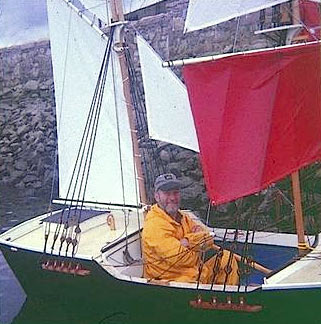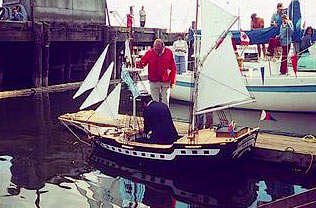|
Sabot Brigantine
by Jordan J.Dobrikin
Once upon a time, in a far off land, Her Majesty’s Crown Colony of British
Columbia, Dominion of Canada; the idea of the Sabot Brigantine was conceived of
by Leslie P. Alfreds at the Jib Set Sailing School.
A committee was struck to plan the building and operation of a Fleet, in time
for the Captain Cook Bicentennial of 1978. Plans, Drawings and Specifications
were commissioned and the building of the Sabot Brigantine VENUS was completed
during the Spring of 1977. Several boats were made and they participated in the
Bicentennial Festivities.

Subsequently the Vancouver Small Ships Society was formed and a building
program was started, aiming at EXPO 86 in Vancouver. There were several Building
Workshops at the Vancouver Boat Shows; Venus was used as a centerpiece of Parade
Floats for the Vancouver Sea Festival(s) where the Society was awarded several
Ribbons over the years. The Fleet(s) were augmented by several Scouts Canada
groups: and then expanded activities in and around Southwestern BC. Nanaimo Sea
Festival(s) (Bath Tub Races), Burnaby Days, the Fraser River Raft Races, as well
as Internationally, by participating in several Wooden Boat Shows in Port
Townsend WA USA. The Boats and Society were given a big, seven (7) page, colour
spread in the Spring, 1985 issue of beautiful BC Magazine. The Society and Boats were called upon to give a Command
Performance for his Royal Highness Prince Phillip.

The original plan/design was based on borrowing Sabot hulls and building
temporary plywood skirts for the hulls and minimally intrusive fittings for the
Rig. This produced a boat that went well on a Run and a Reach, but not all that
well to Windward. In fact it was next to impossible to tack. Some boats were
augmented with small electric trolling motors affixed to the rudder.
After Expo 86 when many of the Sabot hulls had to be returned the plywood
skirts and Rigs were salvaged by using stitch & glue technology to put a
bottom on the existing skirts. This resulted in a nice light weight boat with a
decent underwater profile/surface, that went well to windward and allowed
intermediate and advanced sailors to Tack in moderate sea and wind
conditions.

The Sail Plan consisted of ten (10) fully functional sails; configured as a
Hermaphrodite Brigantine; with three (3) headsails; three Square Sails on the
Main Mast; a Gaff Spanker and a Triangular Top Sail on the Mizzen Mast, both
fore & aft, hence the hermaphrodite terminology; and two (2) triangular Stay
Sails between the masts.
The Sabot Brigantine Plans, consist of four large sheets and a multi page 8
12 x 11 set of Instructions and Tips. These were offered for sale and were sold
the world over, we know of completed boats in Eastern Canada the United States
and Australia, and about fifteen boats that were built in Southwestern British
Columbia. The Yankee Friendship was built on a ten (10’) pram hull, (from
the Friend Boat Works in Everett WA), with no drag inducing skirting, and was
the inspiration for the Stitch & Glue retrofit.

While the Society was building and operating Brigantines and planning a
BLUENOSE an amateur builder was building a sixteen (16’) rowing skiff. In mid
project he converted it into a 17th Century Galleon Hull and brought
it to the Society. A Member of the Society bought it in and the Society then
proceeded to Rig the boat, and make a suit of sails. A square Sail on the
Bowsprit, Course and Topsail on the Main and Fore Masts and a Lateen Sail on the
Mizzen Mast. The hull was fitted with a dagger board; and an outboard well,
suitable for a six (6) horsepower outboard motor.
The Bluenose never got finished; and alas, all of the Society’s boats have
gone to the knackers yard. The Yankee Friendship disappeared into the BC
Interior via a Tool Rental Shop in North Vancouver; and the Galleon is somewhere
in Port Alberni, on a trailer, with a hole (repairable) in her bottom.
|

